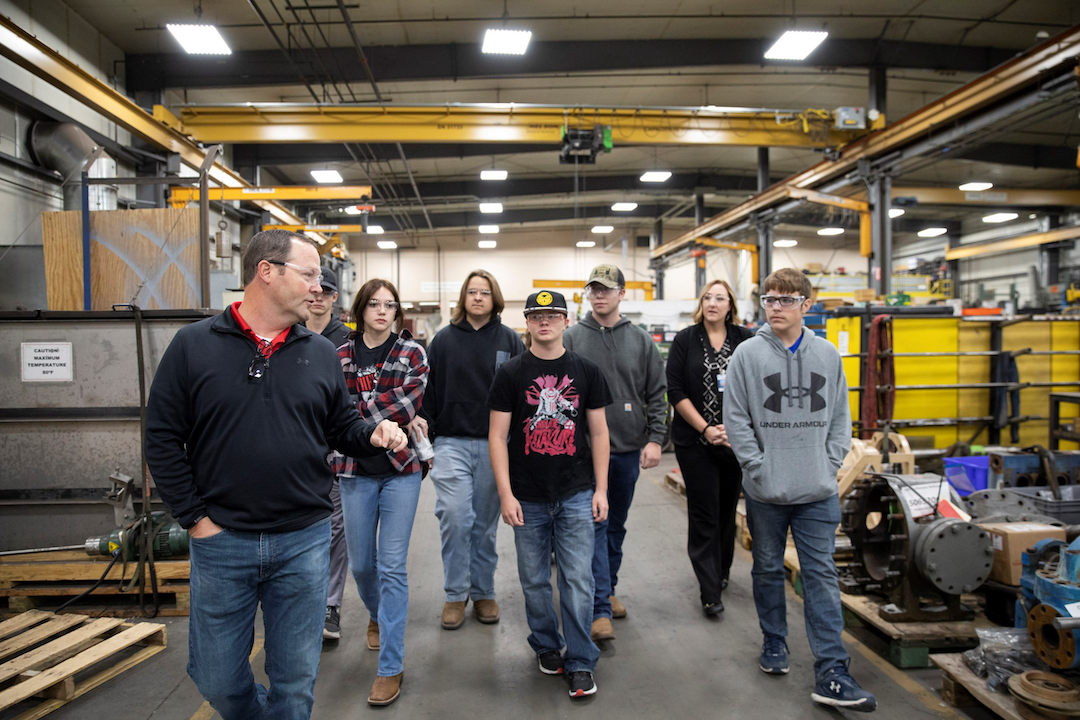Feature photo: Brian Bunch, director of service operations at JCI Industries, Inc. leads a group of LSR7 high school students on a tour of its manufacturing facility. Photo credit: Rebekah Hange, LSR7 School District.
Former LSHS graduate leads district's $224 million reno project
Training and education program sees strength in commercial real estate connections
Recently established in Kansas City, Skilled KC Technical Institute offers alternatives to traditional two- and four-year degree programs as a path to economic independence, thanks to substantial support from a not-for-profit sponsor.
Jeff Barratt leads Skilled KC, a private, non-profit, 501 (c)(3) affiliate of the Ewing Marion Kauffman Foundation.
The foundation brought the Neosho native back to Missouri from Denver, where he headed the Emily Griffith Institute, an award-winning institution that graduates students at an 84% completion rate and places those graduates in great career tracks at an 81% rate, while graduating students debt-free.
Skilled KC has a $2.5 million endowment and reflects Barratt’s belief that “education in entrepreneurship is a way to achieve success.”
“We wanted to create an institution that was nimble and open access so students could get out of low-end jobs and graduate with little or no debt,” Barratt said.
The Skilled KC curriculum touts an entrepreneurial mindset featuring 18 attributes with a focus on creative ideation and communication. Barratt supports that mindset through his hiring philosophy: “We want people who are entrepreneurial.”
The institute is licensed to operate on both sides of the state line. Pilot programs launched this past September. Not surprisingly, the organization had to pivot to be fully virtual and then were able to develop a hybrid approach.
Skilled KC is unique in the way it shapes its presence in the commercial real estate community.
“We have a campus-within-a-campus philosophy. We aren’t interested in large buildings (of our own), so we will partner with private companies or education institutions to use (existing) space. We can collaborate with real estate partners. We’re in the process of formalizing arrangements with external colleagues,” Barratt said.
Another aspect of the business that sets it apart is that Skilled KC is “competency-based and backward-designed from industry feedback,” said Barratt.
Its “earn while you earn” and stackable credential model focuses on the occupations that are the most in demand.
Skilled KC currently has a 6,000-SF facility on a short lease at the foundation (4801 Rockhill Road) and private lab space with the Kansas University Medical Center on State Line Road.
“We’re looking at renovating space as a hub; our model is a hub-and-spoke so we can meet students where they are,” Barratt said.
“We don’t want to spend a lot of money on real estate space because we want flexibility so we can move programs in and out. I’m a driver of efficiency — I hate to see space that is empty. I want to maximize space.”
Barratt said the pandemic created more opportunities that fit its real estate philosophy.
“I wouldn’t want to be an investor in large buildings now. I think there will be a trend or movement into shared space. We will see more big box store partnerships, such as Kohls with Amazon,” Barratt said.
Barratt has found space in Kansas City because “people are seeking me out,” which is gratifying evidence that Skilled KC is seen as an anchor tenant.
“It can be attractive for tax benefits,” he said.
He looks for space in terms of access for students and understanding a community perspective, such as the need for child care and transportation.
“We look at developers with a social perspective,” he said.
The institute has already joined forces with design-architectural partner, Gould Evans.
Skilled KC started with three pilot programs — software development, advanced manufacturing and biotechnology. The next offering will be in cybersecurity.
Plans call for entering the St. Louis market; Barratt is already talking to area businesses about possible connections with that focus. He also envisions eventually taking the institute to a national level.
“The KC site is our proof of concept,” Barratt said.
For more information, see www.skilledkc.org.
Local school construction projects stay on schedule despite pandemic
As schools sit empty and students adjust to learning from home under the current stay-at-home order, many local school construction projects continue to progress.
Hollis + Miller Architects, who specializes in education (architecture and design) and works with a large number of Kansas City-area school districts, has not seen much of a slowdown on their schools’ projects.
The firm is currently working on several school projects to ensure they are ready for the upcoming school year, including Park Hill School District's LEAD Innovation Studio, Liberty School District's Performing Arts Center and new additions to Blue Springs High School, including a state-of-the-art band practice space.
While safety for all contractors has been paramount, the projects have nevertheless been able to move forward, despite the current obstacles.
“We’ve implemented procedures to ensure we maintain project safety and are meeting the safety guidelines of the authorities,” said Mike Chiles, senior project manager for JE Dunn Construction, who is overseeing the trade partners on the Blue Springs HS project.
“Communication is key, and the teams have handled that well with daily huddles and constant on-site supervision,” Chiles said.
Chiles admits the current situation isn’t ideal; nonetheless, has encouraged the team to overcome any obstacles in an effort to keep construction progressing and on schedule.
“It’s a major project for the school and the community, and it will allow them to really expand their programs and ability to impact the community,” Chiles said.
“Maintaining those partnerships among the architect, contractors and trade partners is crucial, especially when a project is facing additional challenges like they are now,” said Kirk Horner, partner at Hollis + Miller.
Several projects remain on schedule to open in time for the fall 2020 school year.
“While the local community will take a while to bounce back from this, we see this kind of construction as a positive sign of economic health. Our local schools are committed to consistently improving the learning environments for our local students, and we’re privileged to contribute to that effort,” Horner said.







